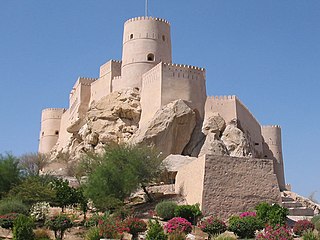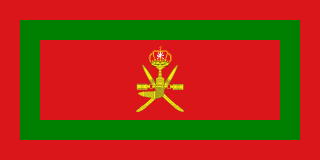| |||||
| Decades: | |||||
|---|---|---|---|---|---|
| See also: | |||||
This articles lists events from the year 2020 in Oman.
| |||||
| Decades: | |||||
|---|---|---|---|---|---|
| See also: | |||||
This articles lists events from the year 2020 in Oman.

Oman, officially the Sultanate of Oman, is an Arabian country located in southwestern Asia. It is situated on the southeastern coast of the Arabian Peninsula, and spans the mouth of the Persian Gulf. Oman shares land borders with Saudi Arabia, the United Arab Emirates, and Yemen, while sharing maritime borders with Iran and Pakistan. The coast is formed by the Arabian Sea on the southeast, and the Gulf of Oman on the northeast. The Madha and Musandam exclaves are surrounded by the United Arab Emirates on their land borders, with the Strait of Hormuz and the Gulf of Oman forming Musandam's coastal boundaries. Muscat is the nation's capital and largest city.

Oman is the site of pre-historic human habitation, stretching back over 100,000 years. The region was impacted by powerful invaders, including other Arab tribes, Portugal and Britain. Oman once possessed the island of Zanzibar, on the east coast of Africa as a colony. Oman also held Gwadar as a colony for many years.

The Politics of Oman take place in a framework of an absolute monarchy, where the Sultan of Oman is both head of state and head of government. The Sultan is hereditary, who appoints a cabinet to assist him. The sultan also serves as the supreme commander of the armed forces and prime minister.

Muscat is the capital and most populated city in Oman. It is the seat of the Governorate of Muscat. According to the National Centre for Statistics and Information (NCSI), the total population of Muscat Governorate was 1.4 million as of September 2018. The metropolitan area spans approximately 3,500 km2 (1,400 sq mi) and includes six provinces called wilayats. Known since the early 1st century AD as an important trading port between the west and the east, Muscat was ruled by various indigenous tribes as well as foreign powers such as the Persians, the Portuguese Empire and the Ottoman Empire at various points in its history. A regional military power in the 18th century, Muscat's influence extended as far as East Africa and Zanzibar. As an important port-town in the Gulf of Oman, Muscat attracted foreign tradesmen and settlers such as the Persians, Balochis and Sindhis. Since the ascension of Qaboos bin Said as Sultan of Oman in 1970, Muscat has experienced rapid infrastructural development that has led to the growth of a vibrant economy and a multi-ethnic society. Muscat is termed as a Beta - Global City by the Globalization and World Cities Research Network.

Said bin Taimur was the 13th Sultan of Muscat and Oman from 10 February 1932 until he was deposed on 23 July 1970 by his son Qaboos bin Said.

Qaboos bin Said Al Said was Sultan of Oman from 23 July 1970 until his death in 2020. A fifteenth-generation descendant of the founder of the House of Al Said, he was the longest-serving leader in the Middle East and Arab world at the time of his death, having ruled for almost half a century.

"as-Salâm as-Solṭâni" is Oman's national anthem; it is an ode originally dedicated to Qaboos bin Said (1940–2020), the former Sultan of Oman.

The Sultanate of Muscat and Oman, also known briefly as the State of Muscat and Oman during the rule of Timur ibn Faisal, was a sovereign state that encompassed the present-day Sultanate of Oman and parts of present-day United Arab Emirates and Pakistan, in the second half of the 19th century and 20th century. Ruled by the Busaid dynasty, it was established as a result of the partition of the Omani Empire upon the death of its last ruler Said ibn Sultan. The Sultanate transitioned into a new form of government after the palace coup of 23 July 1970 in which the sultan Said ibn Timur was immediately deposed in favor of his son Qaboos ibn Said.

The Oman Football Association is the governing body of football in Oman. It was founded in 1978, has been a member of the Asian Football Confederation and of FIFA since 1980.

Yusuf bin Alawi bin Abdullah is an Omani politician. He was the Sultanate of Oman's Minister Responsible for Foreign Affairs. It is important to clarify that "Ministers in Responsibility" were previously appointed as the Sultan was intended to hold the official position of "Minister of Foreign Affairs" himself.
Mazoon bint Ahmad Ali Al-Mashani was the second wife of Sultan Said bin Taimur of Oman and the mother of Sultan Qaboos bin Said. Said's first wife, Fatima Al-Mashani, was her cousin.

The House of Busaid, also known as Al Said dynasty, is the current ruling royal house of the Oman, and former ruling royal house of the Omani Empire, Sultanate of Muscat and Oman and the Sultanate of Zanzibar. It was founded by Ahmad bin Said al-Busaidi, ruler of Oman and its east African territories at the time.

Sayyid Badr Albusaidi is the Foreign Minister of Oman. Sayyid Badr has represented Oman in regional and international meetings, which include the United Nations.
Internal Security Service is the national security agency of the Sultanate of Oman. The agency focuses solely upon domestic security while foreign intelligence operations is specifically handled by the Palace Office, which controls external security and coordinates all intelligence and security policies.

In line with the Arab League position in relation to Israel, Oman does not officially recognize the state of Israel and took part in the boycott of Israel during much of the 20th century.

Haitham bin Tariq Al Said is the current Sultan of Oman.

The 1970 Omani coup d'état was the overthrow of Sultan of Oman Said bin Taimur by his son Qaboos bin Said in Oman on 23 July 1970. Occurring in the midst of the Dhofar Rebellion, the palace coup was executed with the support of the British and saw Sultan Said bin Taimur deposed and sent into exile to the United Kingdom. The coup was a pivotal moment in modern Omani history as Qaboos swiftly set in motion numerous wide-ranging modernization reforms in the kingdom, transforming Oman from an underdeveloped backwater into a country on par with many Western nations in terms of political stability and economic development. At the time of his death in January 2020, Sultan Qaboos was the longest-serving ruler in the Middle East.
Tariq bin Taimur was a member of the Omani royal family who became president of the Council of Ministers of Oman.

Theyazin bin Haitham Al Said is Crown Prince of Oman as the son of Sultan Haitham bin Tariq. He is also the Minister of Culture, Youth and Sports. He was officially appointed as Crown Prince after the Omani government decreed a constitutional adjustment which allows the Sultan to select an heir.